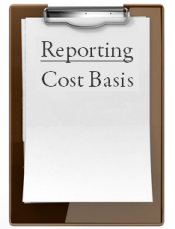Last year, the new cost basis reporting rules went into effect. This greatly impacted brokerage houses as well as taxpayers because of the time required to meet this new requirement. More paperwork is on the way. Specifically, in addition to stocks, you and your broker are now both responsible for reporting the cost basis of mutual funds shares, dividend reinvestment plans (DRIPs) and most exchange traded funds (ETFs) for the sale of such securities during the 2012 tax year.
 Does this new rule apply to all transactions?
Does this new rule apply to all transactions?
Not for the broker. The broker is only responsible for reporting the sale of these securities (in addition to stocks) if they were purchased on or after January 1, 2012. For instance, if you purchased these securities PRIOR to 2012, the financial institutions are not responsible for tracking the cost basis, that is the sole responsibility of the taxpayer. But, you better have supporting documentation to justify the cost basis used when reporting your capital gains.
What cost basis method should I use?
The answer depends on your specific investment portfolio, which investments are in a gain or loss position, when those investments were made and what you expect to happen to your unrealized positions. Most brokerage houses default to the FIFO or average cost reporting method for mutual fund share cost basis reporting. However, you need to review your specific portfolio to do determine if that is the best method for you.
What should I review on my 1099-B form?
You will also want to make sure that you are in agreement with your financial institution as to the cost basis of each of your positions. This is the first year financial institutions will be implementing these new reporting methods for these specific types of securities so it would be wise to identify any mistakes now. Yes, stocks were reported this way last year, but some of these securities such as those in a DRIP program can be incorrectly reported.
Will there be any additional cost basis reporting requirements in the future?
Yes, for the 2014 tax year, most options that are acquired/granted and sold/exercised will need to be reported on the form 1099-B. It wouldn’t hurt to review your portfolio now for options as this may be one of the more tricky reporting requirements the IRS has given brokerage houses in recent time.
More Questions? Browse answers or ask your 1099-b form questions online.
Related Articles
->What Should I Do If I Receive An Incorrect 1099 Form?
->What Do I Need to Know About 1099s?


